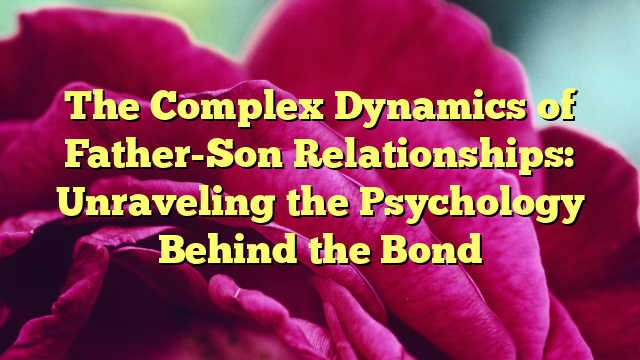The Complex Dynamics of Father-Son Relationships: Unraveling the Psychology Behind the Bond
The Complex Dynamics of Father-Son Relationships: Unraveling the Psychology Behind the Bond
Introduction
Father-son relationships are often seen as a cornerstone of a man’s life. The bond between a father and his son can be both powerful and complex, shaped by a variety of psychological factors. Understanding the dynamics of this relationship can provide valuable insights into the development of masculinity, identity formation, and emotional well-being. In this article, we will delve into the intricate psychology behind father-son relationships and explore the factors that contribute to their complexity.
The Role of Attachment
Attachment theory, developed by psychologist John Bowlby, suggests that the quality of early relationships between infants and their primary caregivers lays the foundation for future relationships. The father-son bond is no exception. A secure attachment between a father and his son fosters a sense of trust, emotional security, and self-confidence. On the other hand, an insecure attachment can lead to difficulties in forming healthy relationships later in life.
Research has shown that fathers who are consistently responsive, emotionally available, and engaged in their son’s lives tend to have sons with higher self-esteem and better social skills. These positive father-son interactions contribute to the development of a secure attachment, which serves as a protective factor against various psychological challenges.
Identity Formation and Gender Role Socialization
Fathers play a crucial role in their son’s identity formation and gender role socialization. As boys grow up, they look to their fathers as role models and seek validation of their masculinity. Fathers often serve as a source of guidance, teaching their sons about societal expectations, values, and behaviors associated with being a man.
During adolescence, the father-son relationship becomes particularly important in shaping a young man’s identity. Sons may imitate their fathers’ behaviors, adopt their beliefs, and strive to meet their expectations. This process of identification with the father figure helps boys develop a sense of self and establish their own masculine identity.
Challenges and Conflicts
Despite the potential for a strong bond, father-son relationships can also be marked by challenges and conflicts. As sons strive for independence and autonomy, they may experience tension with their fathers. This conflict often arises from differences in values, beliefs, and expectations.
Moreover, unresolved issues from the father’s own upbringing can impact the relationship with his son. Fathers who have experienced trauma, neglect, or strained relationships with their own fathers may struggle to provide the emotional support and guidance their sons need. These unresolved issues can lead to a cycle of generational patterns, where the same challenges are passed down from one generation to the next.
Communication and Emotional Expression
Effective communication and emotional expression are vital for maintaining a healthy father-son relationship. However, societal expectations and traditional gender roles can hinder open and honest communication between fathers and sons. Men are often socialized to suppress their emotions and avoid vulnerability, which can create barriers in expressing feelings and connecting on a deeper level.
Encouraging open dialogue and emotional expression can help fathers and sons navigate these challenges. Creating a safe and non-judgmental space for sharing thoughts and emotions can foster a stronger bond and promote emotional well-being for both parties.
Breaking the Cycle
Recognizing and addressing the challenges within father-son relationships is crucial for breaking the cycle of generational patterns. Sons who have experienced strained relationships with their fathers can actively work towards healing and building healthier connections.
Therapy and counseling can provide a supportive environment for exploring and resolving these issues. Through therapy, fathers and sons can gain insight into their own emotions, develop effective communication skills, and learn healthier ways of relating to one another.
Conclusion
The dynamics of father-son relationships are complex and multifaceted. Attachment, identity formation, challenges, communication, and emotional expression all play significant roles in shaping the bond between fathers and sons. Understanding the psychology behind this relationship can help individuals navigate the challenges they may face and foster healthier connections. By unraveling the complexities of father-son relationships, we can pave the way for stronger, more fulfilling bonds between fathers and sons.

